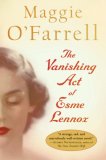Summary | Excerpt | Reading Guide | Reviews | Beyond the Book | Readalikes | Genres & Themes | Author Bio

'Oh.' Her mother looks up. 'Aren't you having your nap?'
'I woke up. Esme balances on one leg, like the birds that come to the pond at night.
'Where's your ayah? Where's Jamila?'
'I don't know. May I have some tea?'
Her mother hesitates, unfolding a napkin across her knee. 'Darling, I rather think-'
'Give her some, if she wants it.' Her father says this without opening his eyes.
Her mother pours tea into a saucer and holds it out. Esme ducks under her outstretched hand and clambers on to her lap. She feels the scratch of lace, the heat of a body underneath white cotton. 'You were a triangle and your Father was a line.'
Her mother shifts in the seat. 'I beg your pardon?'
'I said, you were a triangle-'
'Mmm.' Her mother's hands grip Esme's arms. 'It's really too hot for cuddles today.' Esme is set down on the grass again. 'Why not go and find Kitty? She what she's up to.'
'She's skipping.'
'Couldn't you join in?'
'No.' Esme reaches out and touches the frosted icing on a bun. 'She's too-'
'Esme,' her mother lifts her wrist clear of the table, 'a lady waits to be offered.'
'I just wanted to see what it felt like.'
'Well, please don't.' Her mother leans back in the chair and shuts her eyes.
Esme watches her for a moment. Is she asleep? A blue vein pulses in her neck and her eyes move under the lids. Tiny globes of water, no bigger than pinheads, are pushing out from the skin above her lip. Where her shoe straps end and skin begins, her mother's feet bloom red marks. Her stomach is distended, pushed out with another baby. Esme has felt it, wriggling like a caught fish. Jamila says she thinks this one is lucky, that this one will live.
Esme looks up at the sky, at the flies circling the lily flowers on the pond, at the way her father's clothes protrude from the underside of the hammock in diamonds of loose cloth. In the distance, she can still hear Kitty's skipping rope, the scritch, scritch of the hoe-or is it a different one? Then she hears the drone of an insect. She turns her head to see but it's gone, behind her, to the left of her. She turns again but it's closer, the buzz louder, and she feels the catch of its feet in her hair.
Esme springs up, shaking and shaking her head but the buzzing is louder still and suddenly she feels the crawling flutter of wings on her ear. She shrieks, flailing at her head with her hands but the buzzing is deafening now, blocking out all other sounds, and she feels the insect edging inside the narrow passage of her ear-and what will happen, will it eat through her eardrum and into her brain and will she be deaf like the girl in Kitty's book? Or will she die? Or will it live in her head and she will have this noise inside her for ever?
She lets out another piercing shriek, still shaking her hair, staggering about the lawn, and the shriek turns to sobs and just as the buzzing starts to lift and the insect backs out of her ear, she hears her father saying, 'What is the matter with the child?' and her mother calling across the lawn for Jamila.
Could this be her earliest memory? It might be. A beginning of sorts-the only one she remembers.
Or it might be the time Jamila painted a lacework of henna across her palm. She saw her lifeline, her heartline interrupted by a new pattern. Or Kitty falling into the pond and having to be fished out and taken into the house in a towel. Playing jacks with the cook's children outside the garden's perimeter. Watching the earth around the muscular trunk of the banyan tree boiling with ants. It could just as easily have been these.
Perhaps it was this. A lunch when she was strapped to a chair, the binding tight across her middle. Because, as her mother announced to the room, Esme must learn to behave. Which, Esme knew, meant not getting out of her chair until the meal was finished. She loved the space under the table, you see, they couldn't keep her from it, the illicit privacy under the cloth. There is something peculiarly touching about people's feet. Their shoes, worn down in odd places, the idiosyncrasies in lace-tying, blisters, calluses, who crossed their ankles, who crossed their knees, whose stockings had holes, who wore mismatched socks, who sat with a hand in whose lap-she knew it all. She would slip from her chair, lithe as a cat, and they couldn't reach to hook her out.
Excerpted from THE VANISHING ACT OF ESME LENNOX © 2006 by Maggie O’Farrell. Reprinted by permission of Harcourt, Inc.




Great literature cannot grow from a neglected or impoverished soil...
Click Here to find out who said this, as well as discovering other famous literary quotes!
Your guide toexceptional books
BookBrowse seeks out and recommends the best in contemporary fiction and nonfiction—books that not only engage and entertain but also deepen our understanding of ourselves and the world around us.